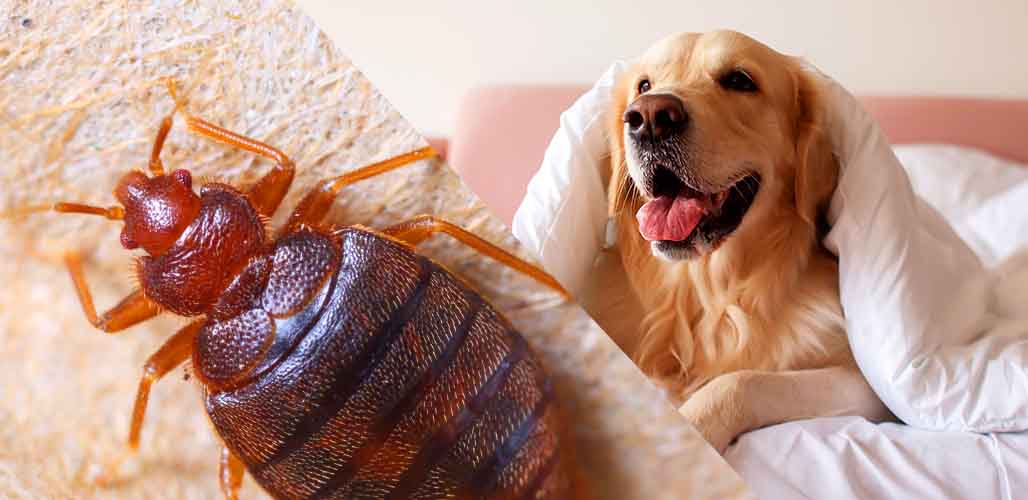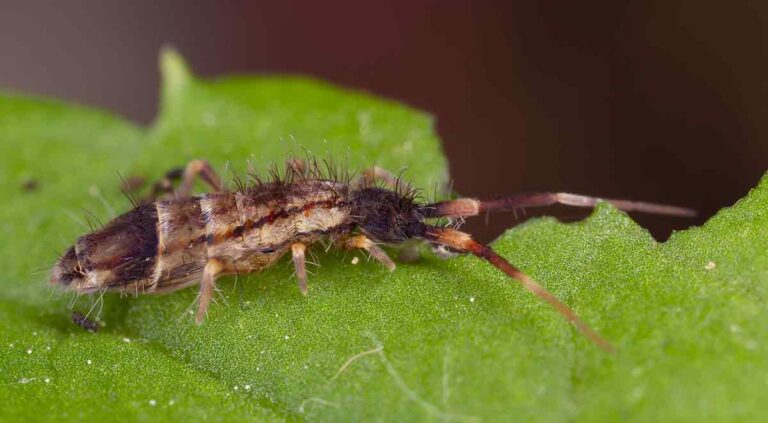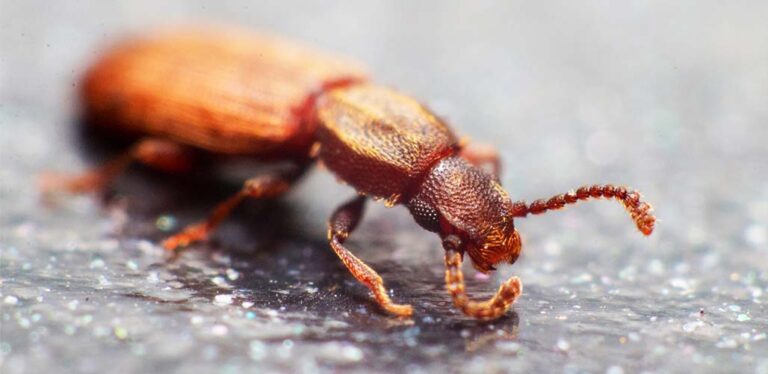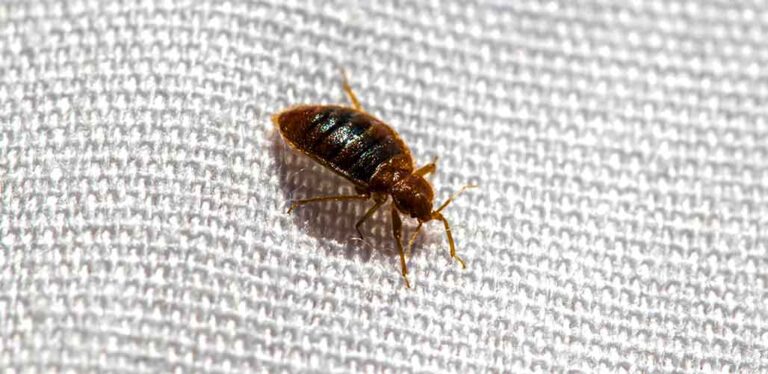Can Dogs Smell Bed Bugs?
Can dogs smell bed bugs? If so, is it something they need to be taught, or can any dog do it? And are the bed bug sniffing canines advertised by pest control companies really reliable? It’s true that dogs can detect the smell of bed bugs. They can even tell the difference between live ones and dead ones. But there’s a lot of conflicting information and evidence about how accurate professional bed bug sniffers actually are. This article is all about the fascinating world of pest control dogs, their amazing sense of smell, and whether they can help rid you of a bed bug infestation once and for all.
Contents
- Can dogs smell bed bugs?
- How accurate and reliable are they?
- What are pest control dogs?
- Hiring a sniffer dog to find your infestation
- Can your pet dog smell bed bugs?
Can dogs smell bed bugs?
Dogs’ sense of smell is legendary. It is their dominant sense, and the primary way in which they make sense of their environment. Their ability to detect and differentiate between minute traces of odor far outstrips our own. Despite being odorless to us humans, bed bugs do release a scent, and it’s one which our dogs can perceive. What’s more, dogs can even tell the difference between the smell of live bed bugs and viable unhatched eggs, versus the smell of their feces, cast skins, empty egg casings, and dead bodies.
What are pest control dogs?
Dogs’ ability to smell bed bugs has not gone unnoticed by pest control professionals and public health bodies. Historically, bed bugs were simply an unpleasant fact of life, all over the world. These tiny parasites hid in the cracks of our homes, and came out at night to deliver itchy bites. Bed bugs are obligatory hematophages, meaning blood is their only food source.
Following World War 2, increased ownership of vacuum cleaners coupled with widespread use of insecticides like DDT almost eliminated bed bugs from our homes. But since the 1980s that trend has begun to reverse again. Bed bug infestations are on the rise again, due to things like increased foreign travel, and the emergence of DDT-resistant bugs.

Enter, pest control dogs. Specially trained sniffer dogs had already been established as powerful weapons for detecting termites in the early 1900s. From the early 2000s training canines to recognize bed bugs also gained momentum. Bed bug detecting dogs are trained using games of hide-and-seek with live bed bugs or viable eggs sealed inside small ventilated canisters. When the dog successfully locates a canister, they’re rewarded with a treat. Decoy canisters with dead bugs, feces, cast skins, and empty egg casings are also hidden, but the dogs don’t get treats for finding them. This teaches them to only look for signs of ongoing live infestations, and not the debris from old infestations that have already been treated.
How accurate and reliable are dogs at smelling bed bugs?
These days, bed bug detection services are widely sought after by homeowners, landlords, hotels, care homes and even hospitals. The businesses that offer bed bug detection using sniffer dogs routine promise accuracy over 95%. But their efficacy is actually far from settled. So how good are they really?
It’s unlikely that many pest control businesses have ever measured the performance of their sniffer dogs in real life conditions. This would require them to perform a human inspection of several properties, as well as searching them with their dog. So promises about their dogs’ abilities are more likely to be based on their performance in a staged training environment. Dogs often perform extremely well in controlled conditions, but these are not the same as the real world.
When independent researchers observed pest control dogs working in naturally infested apartments, they reported that the dogs successfully located just 44% of bed bugs, on average. Performance was highly variable too – some dogs correctly located 100% of bed bug invaders, and others located just 10%. Individual dogs tested several times on separate occasions did not perform consistently every time. The frequency of false positives was also high. Bear in mind, all of these dogs belonged to handlers who estimated their dog’s performance as around 95% accurate.
Why the difference?
So why the discrepancy? Can dogs smell bed bugs or not? Dogs definitely can smell bed bugs, but they’re not machines. There are a number of reasons why bed bug sniffing dogs are sometimes fallible:
- Firstly, dogs are usually trained using samples of pure bed bug odor. But in the real world, their scent is mixed up with lots of other aromas. Dogs aren’t great at generalizing, so they don’t always appreciate that blended scents have the same importance as pure scents.
- Next, all dogs are unique, and they are not uniformly skilled at scent detection work. Ability is shaped by training (which we’ll come back to), temperament, age, and health.
- Next, an individual dog’s accuracy can vary from one job to another, according to factors like stress, anxiety, tiredness and frustration.
- Researchers have also identified environmental factors which affect sniffer dog performance. These include humidity, physical obstacles like furniture, and the amount of time they have already spent working that day.
Bed bug dogs are only as good as their training
As you can see from the video at the top of this page, training sniffer dogs is highly specialist work. Pest control dogs are only as good as their training, and the ability of their handler. Poor training results in dogs who miss live bed bugs, or signal the presence of live bed bugs where there are none (false positives). Since their training works by rewarding them for locating bed bugs, there’s also a significant risk of dogs ‘guessing’ the location of bugs, to secure their prize.
Dogs can also get frustrated if they find bugs, and their handler fails to recognize their signals. Achieving a high standard of accuracy takes hours of methodical training for both dog and handler, and continuous ongoing practice.
Hiring a sniffer dog to find your infestation
Using dogs to identify the presence of bed bugs has the potential to be incredibly effective. Properly trained and handled dogs do achieve high levels of accuracy, and they are much quicker than a human performing a visual inspection of the same area. A well-trained dog is also less likely to miss the early stages of an infestation. Meaning it can be treated more easily, using fewer chemicals, and costing less money.
When you enlist the services of a pest control dog and their handler, check before they arrive whether they offer detection only, or detection and elimination. Some sniffer dog handlers will only confirm the presence of bed bugs, and you’ll still need an exterminator to come and remove the problem.
You might find it helpful to start your search at the World Detector Dog Organization (WDDO) website. The WDDO accredits sniffer dogs across a wide range of disciplines including police dogs, search and rescue dogs, and pest control dogs. However, some research indicates that certification status is not proof of a minimum level of ability.
Can your pet dog smell bed bugs?
Yes, your dog can probably smell bed bugs. But without specific training to respond to that smell in a recognizable way, their skill is pretty useless. If you want canine help identifying an infestation in your home, you’ll need to call in a professional.
Can dogs smell bed bugs? Summary
Dogs can smell bed bugs – even very small infestations of just a handful of bugs. Their ability to detect bed bugs is extremely accurate in controlled conditions. But in real life situations it can be dramatically affected by things like competing smells, tiredness, and poor training. Unfortunately, without specialized training there’s no way of knowing if your pet dog has picked the scent of unwanted intruders in your home. This job is best left to professionals!







